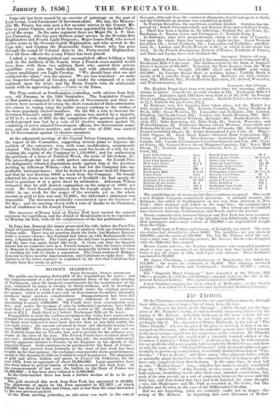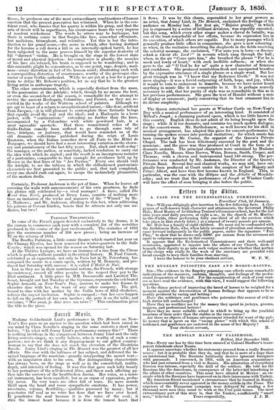g4t T4ratrrs,
Of the Christmas entertaiments two are especially prominent, through their difference, not of degree but of kind, from the rest.
One of these is the ffierie at the Olympic ; which, though not the hap- piest of Mr. Planche's works, is endowed with surpassing interest by the acting of Mr. Robson : with him burlesque is the mere vehicle for ex- hibiting something which if it be not tragic genius is at any rate ex- ceedingly like it. The character of Prince Richcraft, in the tale of " Tho Three Distaffs," whence the plot of the piece is derived, is that of an un- scrupulous Giovanni, who when his seductive powers have failed resorts to the most savage expedients for vengeance on the virtuous. Mr. Planche has already favoured the world with a tolerably learned edition of the Countess d'Aulnoy's "Fairy Tales ": perhaps, some day, he will annotate for our profit the still more popular tales assigned to Mother Goose, and show us why the tone of the " Discreet Princess," with its moral addressed par- ticularly to grown-up young ladies, is so totally distinct from that of "Cin- derella," "Puss in Boots," and those many other pleasant fables which so naturally adapt themselves to the comprehension of young people who have only completed their first lustrum. At the same time, he may tell us who "Mother Goose" was,—whether her name is merely translated from the "Mere POie " of the French, or vice versa ; or whether, rather, both nations, furnishing words after their own internal convictions, hit, each of its own accord, on a sort of connexion between the goose and the fairy tale, and thus found that they had both hatched the same thought —not, like Shakespere and Mr. Puff as recorded in The aitie, but like Leibnitz and Newton in the case of the Differential Calculus.
But we are forgetting, what we certainly ought not to forget—the acting of Mr. Robson. In depicting this same Giovanni of Mother
Goose, he produces one of the most extraordinary combinations of human emotion that the present generation has witnessed.. When he is the con- fident roué, who fancies that his quarry is within his grasp, and that the arts of deceit will be superfluous, his countenance bears the very impress of insolent wickedness. The words he utters may be burlesque, but there is nothing comic in that Borgia-like face, somewhat effeminate, but malicious, triumphant, and relentless. Yet this is but the intro- duction to his grand scene,—the scene in which, after having destined for the heroine a roll down a hill in an internally-spiked barrel, he has been subjected to the same process himself by the superior dexterity of his" discreet " victim. He is brought on the stage in the lowest state of moral and physical dejection : his complexion is ghastly, the muscles of his face are relaxed, his brain is supposed to be wandering ; and in this miserable plight he concentrates, as to one point, rage, despair, mad- ness—every distortion in fact of the human mind ; illustrating each with a corresponding distortion of countenance, worthy of the grotesque cha- racter of some Gothic cathedral. 'While we are yet at a loss for a proper term to define Mr. Robson's position, let us say that he is the greatest living artist in arabesque tragedy. The other entertainment, which is especially distinct from the mass, is the pantomime at the Adelphi ; which, though by no means the best, or even the second-best of the season, is remarkable for the attempt to revive the ancient Harlequin, Columbine, and Pierrot, as they are re- corded in the.works of the Watteau school of painters. Although we are apt to boast of a return to unsophisticated nature,—like dear, artificial 'Jean Jaeques,—it is still pleasant to contemplate those fantastic beings that equally avoid the real and the ideal ; and a Harlequin in a loose jacket, with " contimiations" extending no further than the knee, accompanied by a Columbine with white powdered hair, is a most agreeable spectacle. Had these resuscitated relics of the -Gallo-Italian comedy been suffered to go through some tale of love, intrigue, or jealousy, that would have reminded us of the old dramatic collections published during the reign of Louis Quatorze, when the Italian comedies drew all Paris to the Hotel de Burgogne, we should have bad a most interesting variation on the clown- ery and pantaloonery of the last fifty years. But, deck and well-a-day ! the manager, or the author, or somebody, lacked resolution to carry out the idea with which he started ; and the result is an incongruous monster of a pantomime comparable to that example for avoidance held up by Horace in the first lines of his " Ars Poctica." Every one should visit the Adelphi, to see the tableau in which the oldfashioned pantomimic characters are first presented to the public ; and, that task completed, every one should rush out again, to escape the melancholy pleasantries of the modern drolls.











































 Previous page
Previous page